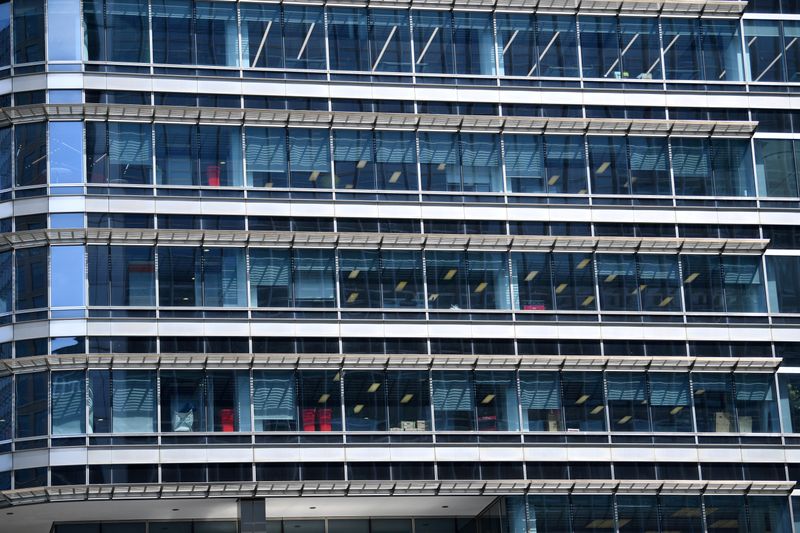By Sinead Cruise
LONDON (Reuters) - The coronavirus pandemic has emptied offices and shuttered shops but filled warehouses and highlighted demand for work-from-home spaces, leaving investors wondering if they should flee real estate or double down on their bets.
Property has long been a staple of a balanced investment portfolio, favoured by pension funds and insurers seeking assets that combine capital value growth offered by stocks with secure income akin to bonds.
But government lockdowns to contain COVID-19 have spurred unprecedented changes in the way billions of people live and work, denting values and rental prospects of malls and skyscrapers and making property investment a far bigger gamble.
"It is unclear whether we will see more demand for real estate because of social distancing, or less because of the home office," Joe Stadler, head of the ultra-high net worth business at UBS (S:UBSG) told Reuters, describing the conundrum as a key focus for clients.
Millions of staff are now working from home while online shopping sales reported by Alibaba (N:BABA) and Amazon (O:AMZN) have soared.
Savills (L:SVS) is forecasting prime European office rents to drop by between 2 and 10% this year, while first-quarter yields on prime European shopping centres have softened by 39 bps to 5.1% compared to 2019.
In contrast, demand for logistics real estate could grow by 150-200 million square feet annually for the next two-to-three years in the United States, industrial property firm ProLogis (N:PLD) said.
And some of the boldest investors are not only sticking with the property asset class but raising their stakes.
Data from alternative assets research firm Preqin showed European focused property funds attracted $13.2 billion from investors between April 1 and May 28, the highest quarterly volume seen since Q4 2017, with one month of the quarter remaining.
Swapping offices and shops for storage and industrial property appears like a simple solution.
But few analysts and advisers are certain that changes to the way the world uses real estate will outlast the pandemic, and radical portfolio shifts now could cost investors dearly.
Asset allocators like Columbia Threadneedle (N:AMP) have confirmed "neutral" stances on property this week, while many of the world's biggest companies have given mixed signals on their future real estate needs, compounding uncertainty for landlords.
Mastercard (N:MA), Visa (N:V) and American Express (N:AXP) have ruled out rapid returns to the office and may consolidate buildings if staff prefer home-based working.
Others like Exane SA, part of BNP Paribas (PA:BNPP), are expanding their offices. Exane last week agreed to lease 40,000 square feet in London from Great Portland Estates (L:GPOR) for its cash equities business.
SUPPORTIVE FUNDAMENTALS
A global economic downturn could hurt rental rates and trigger vacancies in some cases but broader market fundamentals remain supportive of careful property investment, analysts say.
With government bond yields trending downwards and even sliding into negative territory, some 15% of corporate bonds seeing downgrades and the mass cancellation of stock dividends, investors are thirsting for income that property could satisfy.
Expectations that $9 trillion of global coronavirus stimulus efforts by policymakers could fuel inflation in 2021 may further boost demand for property, which can hedge against inflation's hit to bonds and gilts.
And as fears about the longevity of a U.S. stock market rally gather pace, some investors are expected to lock in gains, which could see more cash move into alternative assets.
Given such uncertainty on future cash flows linked to offices and malls, some advisers and investors said residential investment might be the safest bet for now.
UBS said U.S. apartments had the highest average rent collections of any major property type and a 4.2% first-quarter vacancy rate was in line with previous quarters.
British insurer Aviva (L:AV) last week said it expected the coronavirus to knock residential values by 12% but commercial assets would fall by 15% before growth resumed.
"With so many now living, learning, working and playing from home, investing in residential can accomplish multiple objectives," said Andrew Angeli, head of strategy & research EMEA at CBRE Global Investors (N:CBRE).

"Affordable housing is proving cyclically resilient and delivers a positive social impact. Furthermore, tenant-friendly government intervention helps sustain residential occupancy rates and ultimately cash flows. And that's what it's all about right now."